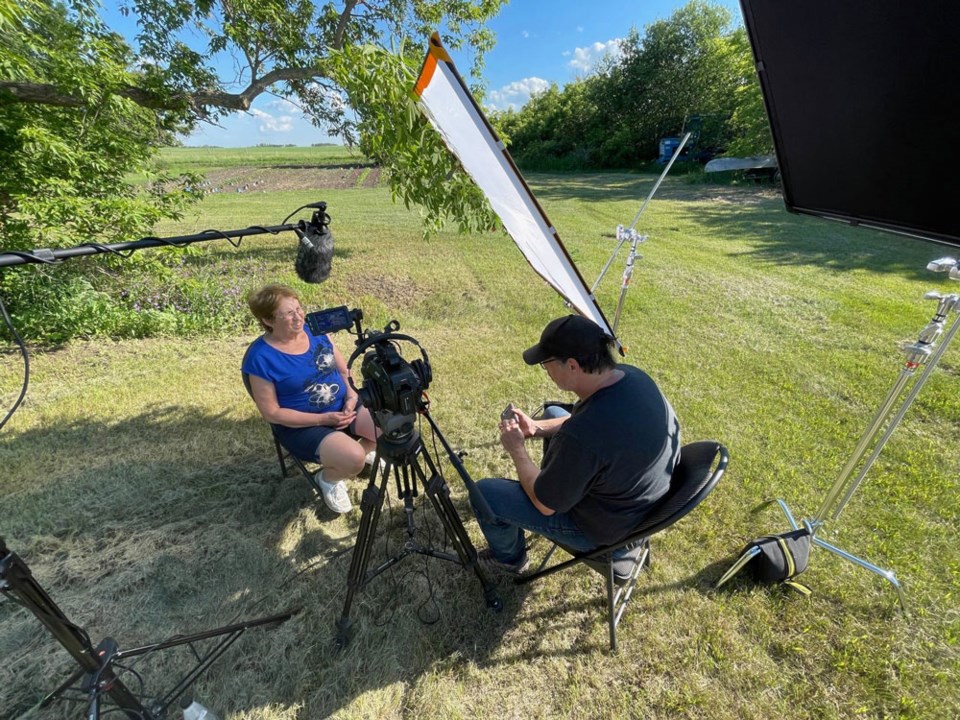MIDALE - The Mainprize documentary, a project aimed at creating a feature-length movie about Dr. William Graham Mainprize or Doc, a strong character and a symbolic figure in the history of Midale and area, has seen more progress.
Project director Jack Hilkewich and crew wrapped up a series of on-camera interviews in Midale and the surrounding area this summer. A few additional on-camera interviews are planned for the fall to finish this portion of the documentary.
"Content-wise, we've gathered a number of interviews with people. I think the last time we went out we got 12 to 14 interviews, which was a significant amount. And we were actually able to recently get an interview with Dr. Anne Grahame. She used to be the Midale doctor," Hilkewich said.
Grahame came to Midale a year after Mainprize died, so she had some knowledge and insights about the man and his work. She shared that Doc's maternity notes were "quite a piece of art." So the movie crew now hopes to do some research on those documents to share that side of Mainprize with the spectators in the future.
Hilkewich added that it was interesting to hear Graham's perspective on things, as her life path was similar to one of Mainprize's.
"She came to Canada from Europe and settled here, in a small town. And that's kind of exactly what the documentary is about, people that left and came to settle here. So it was nice to get her perspective," Hilkewich said.
He added that they always had a plan to do some more local interviews.
"We had three or four for sure lined up. And then as the time got closer, I was putting more time and effort into researching people and trying to get a hold of people," Hilkewich said.
The committee plans to put aside the money that is absolutely necessary for post-production, and then they'll be able to decide how much more shooting they can do, as the remaining part of the interviews is to be done out of province. Hilkewich said there should be at least one shooting trip.
Once shooting is done, which is expected to happen toward the end of fall, the post-production phase will begin, which will include securing a distributor to ensure as much of the world sees this aspect of the local history.
Post-production will also involve sifting through the many interviews and miscellaneous footage to tell the desired story of Dr. Mainprize and the pioneers who assisted him. They said that the prairie spirit and environment will also have a prominent place in the film, but not all interviews will make the final cut.
So the committee is considering other formats to showcase all the stories they've received over the years. So far, the plan is to hand over all materials, including private photographs and home movies, to the Saskatchewan Provincial Archives (SPA). The executive will contact those who have provided them with supporting material to see if this is something they would like to see happen.
"They're (SPA) very keen on what it is that we're doing. That amount of history that they can have at their disposal for future generations, they are quite excited about it," said producer Murray Kerr. "We announced that also on our Facebook page, and we got a really good response from that as well. People liked the fact that these photographs and home movies aren't going to go back into somebody's closet or in an attic. It's actually going to be catalogued. So we're pretty excited about it."
Once closer to that, the committee will be reaching out to all participants to obtain permissions and in some cases originals.
The six-person volunteer executive committee also continues to work on some ventures to help fund the documentary.
"We're still fundraising," said Kerr. "We've got two significant large donations that we're very appreciative of."
The documentary committee was able to raise just under $50,000 and have another bigger donation confirmed. However, to finish the full-scale film they would need closer to $200,000 in a perfect scenario, Hilkewich said.
"We got a few projects that maybe help close that gap. Whether we actually get the 200,000, time will tell but we're still working on trying to get to that goal," Kerr added.
While there is a plan B to produce a one-hour documentary, the committee is still working towards making everything properly to produce a feature-length documentary that can be played in theatres around the world.
In their fundraising efforts, they partnered with the RM of Cymri and are now able to issue tax receipts.
"The partnership between the documentary executive and the RM shows how people can come together to reach a common goal," the committee said.
They also hope to secure funds to offer in perpetuity three Dr. William Graham Mainprize Scholarships. One scholarship offered by three Saskatchewan post-secondary institutions to a Saskatchewan resident entering one of 60-plus medical-related programs.
They have also been working with a Los Angeles advertising company to secure national brand advertisers for strategic product placement to ensure their goal of producing a theatre-quality film.
And while they haven't reached the fundraising goal yet, there is some flexibility and progress that will help the committee with their plans.
"We've already been talking to a broadcaster about a sale, they would like to broadcast it. And also we have some company that wants to donate promotional money," Hilkewich shared, explaining that the last allow using some of the raised money now, that the promotion part of the project will be covered later.
If someone wants to support the project, donations can be made through the RM of Cymri. Details can be found at the documentary website at www.mainprizeproject.ca. Hilkewich can be contacted at [email protected].



